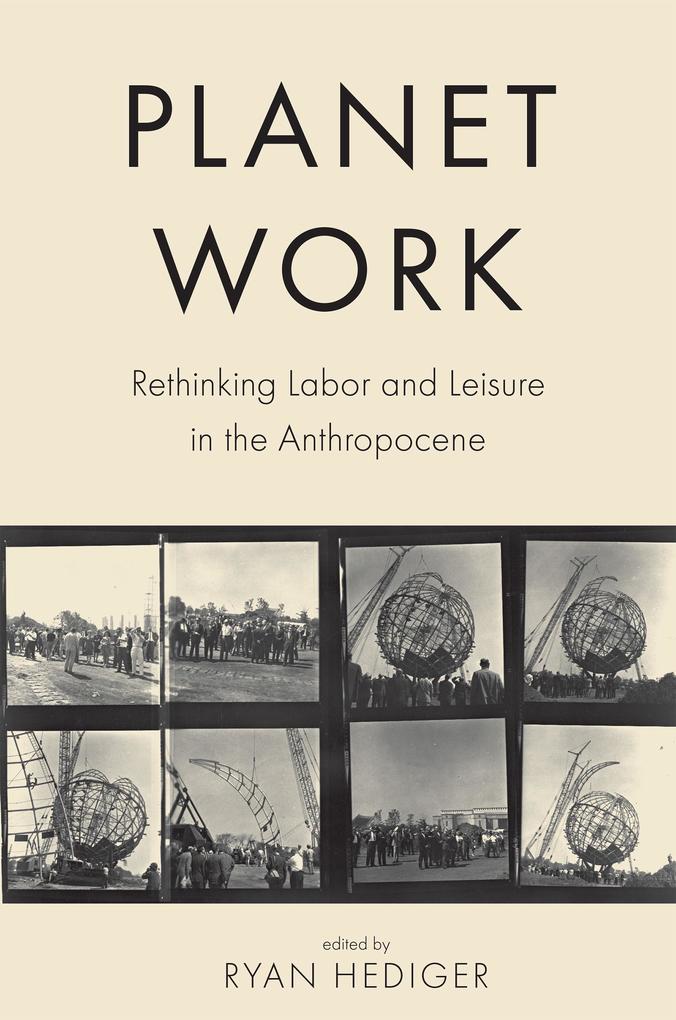
Zustellung: Mi, 02.07. - Di, 08.07.
Versand in 3-4 Wochen
VersandkostenfreiBestellen & in Filiale abholen:
Labor and labor norms orient much of contemporary life, organizing our days and years. Yet, surprisingly, work norms have not been sufficiently interrogated for their profound roles in climate change and other crises gathered under the term “Anthropocene.” Essays in this book expose deep flaws in ideas of work and investigate leisure practices for (sometimes radically) alternative ways of life.
Inhaltsverzeichnis
Introduction: Denaturalizing the Slow Violence of Work
Ryan Hediger
Section One: Questioning “Anthropocene” Frames
Chapter 1: What’s Past is Prologue: The Dragon, the Phoenix, and the Golden Spike
David L. Rodland
Chapter 2: Anthropocene Performance: Work without Ends
Ted Geier
Section Two: Rethinking Work in the Anthropocene
Chapter 3: Unfree Labor: Slavery and the Anthropocene in the Americas
Ryan Hediger
Chapter 4: The Rise of the Novel and the Narrative Labor of Horses in the English Novel of the Early Anthropocene
Sinan Ak ll
Chapter 5: Reconstruction Agrarianism in Douglass and Burroughs: Relational Labor Against White Supremacist Ownership
Daniel Clausen
Chapter 6: The Work of the Globe: How the Unisphere, Icon of the 1964-65 World’s Fair, Illuminates the Nature of Modern Work
James Armstrong
Chapter 7: Leisure and Light Work: Coming of Age in Wendell Berry’s and Thomas Pynchon’s Novels of Extraction
Matt Wanat
Section Three: Learning from Leisure in the Anthropocene
Chapter 8: Walking the Line between Leisure and Labor: Dorothy Wordsworth and Harriet Martineau in the English Lake District
Amanda Adams
Chapter 9: Labor, Leisure and Love of Country: Rangering in the Age of the Alt-NPS
Jennifer K. Ladino
Chapter 10: Learning to Play in the Anthropocene: Winter Recreation and the Politics of Climate Change
Will Elliot and Kevin Maier
Chapter 11: Weaving “Lifeworkings”: Goanna Walking between Humanism and Posthumanism, Dharug Women’s Way
Jo Rey
Coda
Pedagogical Anthropo/Scenes: Reviving Craft in the Academy
Sharon O'Dair
Acknowledgements
Notes
Bibliography
Notes on Contributors
Index
Ryan Hediger
Section One: Questioning “Anthropocene” Frames
Chapter 1: What’s Past is Prologue: The Dragon, the Phoenix, and the Golden Spike
David L. Rodland
Chapter 2: Anthropocene Performance: Work without Ends
Ted Geier
Section Two: Rethinking Work in the Anthropocene
Chapter 3: Unfree Labor: Slavery and the Anthropocene in the Americas
Ryan Hediger
Chapter 4: The Rise of the Novel and the Narrative Labor of Horses in the English Novel of the Early Anthropocene
Sinan Ak ll
Chapter 5: Reconstruction Agrarianism in Douglass and Burroughs: Relational Labor Against White Supremacist Ownership
Daniel Clausen
Chapter 6: The Work of the Globe: How the Unisphere, Icon of the 1964-65 World’s Fair, Illuminates the Nature of Modern Work
James Armstrong
Chapter 7: Leisure and Light Work: Coming of Age in Wendell Berry’s and Thomas Pynchon’s Novels of Extraction
Matt Wanat
Section Three: Learning from Leisure in the Anthropocene
Chapter 8: Walking the Line between Leisure and Labor: Dorothy Wordsworth and Harriet Martineau in the English Lake District
Amanda Adams
Chapter 9: Labor, Leisure and Love of Country: Rangering in the Age of the Alt-NPS
Jennifer K. Ladino
Chapter 10: Learning to Play in the Anthropocene: Winter Recreation and the Politics of Climate Change
Will Elliot and Kevin Maier
Chapter 11: Weaving “Lifeworkings”: Goanna Walking between Humanism and Posthumanism, Dharug Women’s Way
Jo Rey
Coda
Pedagogical Anthropo/Scenes: Reviving Craft in the Academy
Sharon O'Dair
Acknowledgements
Notes
Bibliography
Notes on Contributors
Index
Produktdetails
Erscheinungsdatum
09. Dezember 2022
Sprache
englisch
Seitenanzahl
284
Herausgegeben von
Ryan Hediger
Verlag/Hersteller
Produktart
kartoniert
Gewicht
442 g
Größe (L/B/H)
157/234/20 mm
ISBN
9781684484584
Entdecken Sie mehr
Bewertungen
0 Bewertungen
Es wurden noch keine Bewertungen abgegeben. Schreiben Sie die erste Bewertung zu "Planet Work" und helfen Sie damit anderen bei der Kaufentscheidung.









